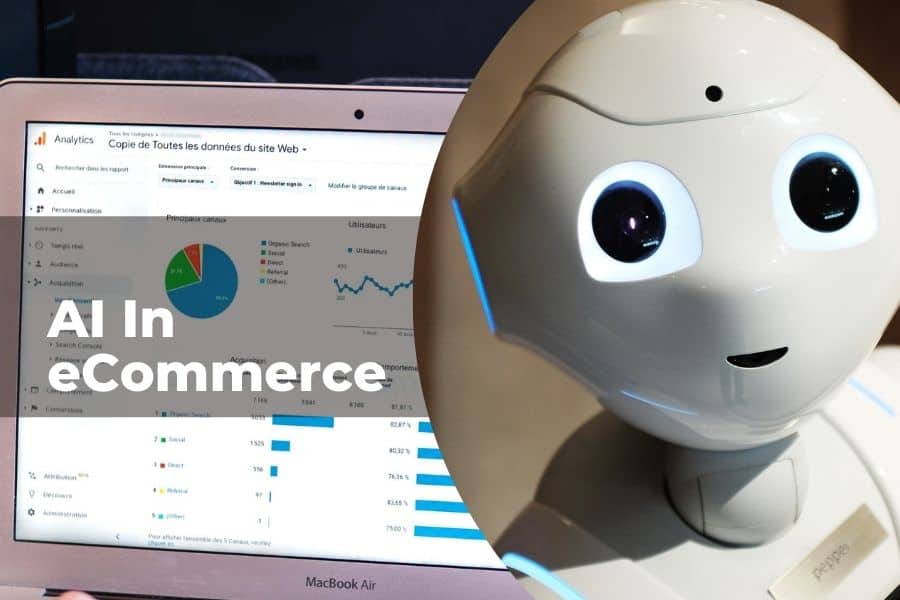In the last few years, we have seen technology revolutionizing the way by which we used to interact with it. We can now interact with our gestures, voice, motions, etc. All this has become possible because of the evolution of artificial intelligence. Artificial intelligence has unleashed the true potential of the e-commerce industry and opening many new opportunities in improving the customer experience, generating new business, and has a better understanding of business. The e-commerce industry is finding new ways to incorporate artificial intelligence in its business operations. In this article, we are going to discuss the different ways by which you can use artificial intelligence in your e-commerce store.
Role Of AI In eCommerce Industry Along With Stats

AI is helping e-commerce merchants to predict & sense customer behavior and automate business operations. Using AI you can improve the user experience and improve the reputation of your brand. It is helping startups, manufacturers, and retailers to set a new example in the industry. There are numerous implications by which retailers can sell products & services. AI is capable of solving real-world issues which e-commerce businesses are facing. In 2016, AI-driven the business of $8 billion and is expected to reach $49 billion by 2021, in a wide range of e-commerce industries. As per Gartner, by 2020, more than 80% of customer interaction in the e-commerce industry will be handled by AI. You would be surprised to know that 20% are ready to purchase things from a chatbot, and these customers can spend up to $350. 40% of customers use chatbots to check new discounts, offers, and deals. Recently, Google invested 400 million euros in taking over an artificial intelligence company, Deepmind. Voice search, another tool of AI can take over the searching.
So how you can use AI for generating business on your e-commerce store? Well, no worries, we have mentioned a few ways by which you can use AI for your ecommerce store. Let’s begin…
1. Customer-Centric Search
As per the industry experts, one of the main reasons why customers leave an ecommerce store is irrelevant to search results for a product search. You can tackle this problem by using natural language processing for narrowing, contextualize, and ultimately improve the search results for the customers.
Many e-commerce stores are now going to provide the next level of search experience by providing the option of search with vision. Hence you must give special focus to develop a smarter app that can “see the world as you do”. It will empower you to give a customer-centric search experience through advanced video & audio recognition.
2. Retargeting Potential Customers
Do you know that nearly one-third of the marketing leads are not followed up by the sales team? It means that you are losing a major chunk of the pre-qualified buyers who are interested in your product or service. Also, there are many businesses that are highly overloaded with customer data and are not able to manage it. This data is a goldmine of intelligence that they can use to generate sales and provide a better customer experience.
But how you can use AI for enhancing the customer’s shopping experience? Take an example, suppose a visitor gives a considerable amount of time in checking out the latest iPad features, price, and other attributes, then this information can be stored and will be used to serve the customer upon his next visit. The strategy of sales is changing with the usage of AI and is serving the customer as per his/her need.
3. Identification Of Exceptional Prospects
You can use the new artificial intelligence technology for solving business challenges involving time such as generating leads.
Mintigo, a predictive marketing business provides artificial intelligence solutions for marketing, sales, or CRMs. Using the Mintigo AI solution, Getty images has successfully generated significant new leads by capturing the data that shows which businesses have websites featuring images from Getty’s competitors.
Now they can identify the new essential aspects and the sales team can leverage this for generating new & more business.
4. Creating A More Efficient Sales Process
There was a time when the clients were pitched through methods such as cold-calling and picking of the trusty Yellow pages. But these days of the old sales techniques have now gone. The customers now interact with the products through advertisements on television or social media platforms, which is opening new opportunities for the sales team.
Many AI systems are using NLP learning & voice recognition technology such as Siri or Alexa. This allows your app to answer customer queries, solve their queries, and creating new exciting ways for your sales team.
5. New Level Of Personalization
Personalization is not a new thing in e-commerce. Every e-commerce store tries to give the best level of personalization for their customers. If you have used Amazon then you can easily understand what we are referring to. When you search for a watch and browse watches of FOSSIL, Daniel Wellington, etc. then on the next visit you can observe the suggestions for many other watches as well. This is called customer personalization.
However, with the evolution of AI and ML technologies, the level of personalization has increased to meet the new expectation of customers in the rapidly growing e-commerce world.
6. Use Chatbots For A Personal Touch
Whether you call it a revolution or an intrusion, chatbots have gained a significant place in e-commerce practices. From the top giant companies like Google, or Amazon, to medium and small-scale e-commerce stores, all are actively using chatbots for their business operations. Whether it is a customer support task or team communication work the chatbots can handle all. Chatbots can act as your marketing expert or conversational tool. It will also help in reducing customer support costs. They give a highly personalized experience with a faster and accurate response. Also, chatbots can be deployed to many different platforms, such as Facebook Messenger, Whatsapp, and others.
7. Using Virtual Assistants
We all have used virtual assistants such as Amazon Alexa, Google Assistant, or Microsoft Cortana. These virtual assistants can listen to our queries and resolves them immediately. Let’s take the example of Amazon Alexa. It can serve the purpose of shopping just by saying the product’s name on the Alexa speaker or you can also use it for playing your favorite music. Virtual assistants are impacting the way customers purchase and provide a creative opportunity for eCommerce retailers to take advantage of.
8. Integration With The Daily Home Devices
Many companies such as LG, Samsung devices have launched many Home devices which come with in-built Artificial intelligence. These Home Devices are helping people in many different ways. They can give regular updates to the users and also helps in performing many tasks.
9. Better Recommendations To The Customers
AI is capable to scan through petabytes of data to identify the user behavior and then giving him proper product recommendations. Product recommendations are the main attribute for delivering a personalized experience to the customers. AI can leverage a variety of inputs, including account information, customer preferences, purchase history, third-party data, and contextual information.
In the retail industry, product recommendations are always appreciated in both brick-and-mortar stores and e-commerce stores. Amazon has highly benefitted from this. They have given the product recommendations based on the activities on this site or past orders.
10. Virtual Personal Shoppers
We have already mentioned how AI is coming with the solutions like Virtual assistants but it is also enabling the brands to create purposefully-built “shoppers” for helping their customers online. There are many benefits of shopping in a brick-and-mortar such as a customer can directly interact with a sales assistant. They can ask the customers for what color, size, or design of the product they are looking. However, all these things are limited to online shopping.
In online shopping, the customers have to go through tiring or even frustrating ticks of filters. To eliminate this, e-commerce retailers have found new ways of providing the perks of offline experience to online experience.
Flipkart, the Indian-based eCommerce company, has already made attempts to build human brain-like capabilities in order to sell smarter to more than 45 million of its registered online buyers.
11. Creating An “Assortment Intelligence” Tool
There have been many scenarios when the customers have to feel to negotiate with the merchants for the prices. Hence, it has become necessary for the marketplaces to give flexibility to the merchants for price restructuring.
Assortment Intelligence is a new tool that gives retailers 24/7 visibility of the competitors’ product assortments. They can monitor the competitor’s product mix which would be segmented by product and brand as well as the percentage of overlap.
12. Narrowing The Gap Between Personalization & Privacy
Personalization and privacy have always been hot topics. In order to provide a personalization experience, the brands shouldn’t jeopardize the privacy of the users. The companies are now striving to take transparency, security, and honesty to a new level. But they should come in hand with personalization as it has a major role in the e-commerce business. AI is helpful in this. Voice recognition of AI is helping the brands to understand the needs of customers without breaching their privacy.
13. Wearable Technology Is Helping In Generating Sales
Wearable technology has seen a huge growth in the recent 4-5 years. Wearable devices such as smartwatches, rings, etc. have the ability to get data that even smartphones are not able to get. Some wearable technology can see what products you view, define your taste, and can instantly recommend personalized products.
If you start to add in physical data such as vital statistics, measurements, and pupil dilation rate, the level to which recommendations could be tailored is truly incredible.
14. Eliminating Fake Reviews
When a retailer gets fake reviews for his brand or product nothing can be more painful for that retailer. Word of mouth is the most valuable marketing strategy but if goes negative then it can have serious impacts. If your friend has purchased a product and gives positive reviews for it then you will tend to purchase but vice versa is also true.
Also, nearly 86% of the buying decisions are influenced by negative reviews, and what if these reviews are fake? Creating fake reviews is terms as “astroturfing” and it is quite common in many sites including Amazon. The definition of astroturfing is the deceptive practice of presenting an orchestrated marketing or public relations campaign in the guise of unsolicited comments from members of the public. AI can help in determining whether a review is fake or not by checking out the customers’ previous purchases and profiles.
15. Eliminating Fake Products
In large marketplaces, there is always a risk of sellers selling fake products. It is difficult to identify whether a product is genuine or counterfeit. The customer buys the product thinking that it is genuine but it then seems fake and negatively impacts the consumers’ perception of the brand.
Brands are now using AI and ML to combat these scenarios.
Wrapping Up
In this article, we have gone through different aspects by which AI can be useful for improving your e-commerce business. It can reduce the cost of customer care, helps in providing a personalized experience, eliminating fake reviews or products, and much more. If you are planning to launch an ecommerce store equipped with AI then hiring an ecommerce expert is definitely a good idea.


